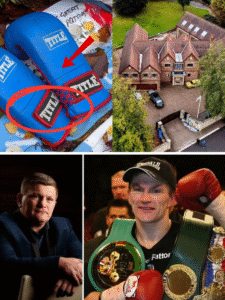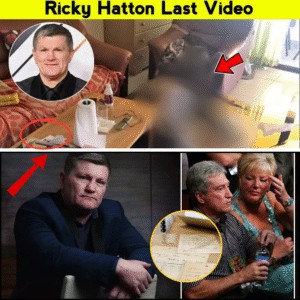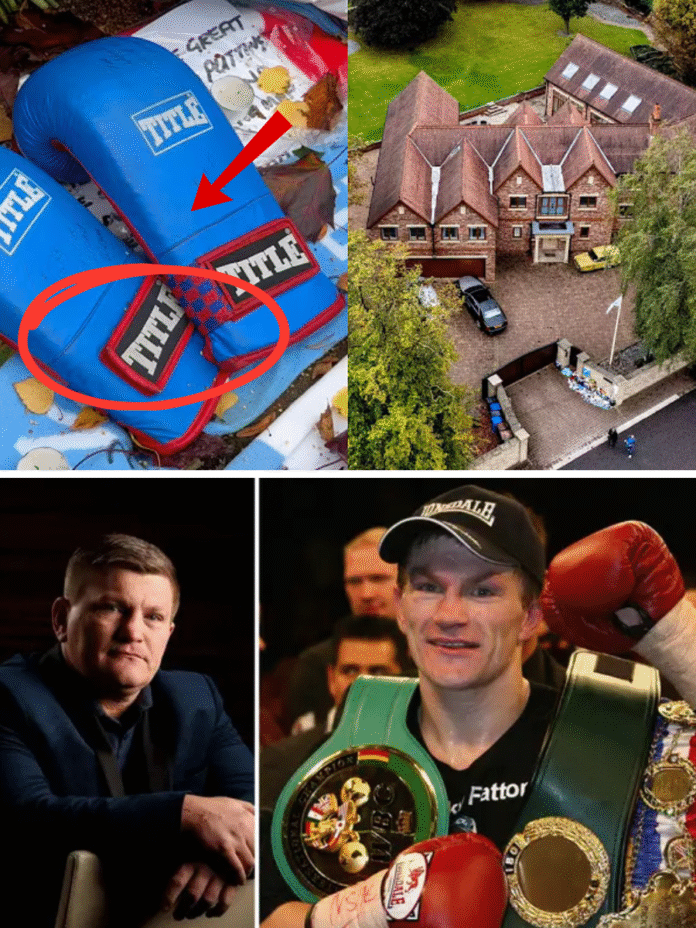💔 EXCLUSIVE: Ricky Hatton’s Last Belongings — A Torn Glove, a Handwritten Letter, and an Intact Dinner Plate: The Heartbreaking Connections Revealed

In the quiet suburbs of Greater Manchester, where the roar of boxing crowds once echoed in the dreams of a young Ricky “The Hitman” Hatton, a tragic silence has fallen. Just one week ago, on September 15, 2025, the world was shattered by the news of the 46-year-old boxing legend’s untimely death at his home in Gee Cross. What began as a somber outpouring of grief—flowers, t-shirts scrawled with “RIP Rick,” and lone boxing gloves left at his gate—has now evolved into something profoundly intimate and gut-wrenching. Exclusive access to Hatton’s final estate inventory reveals a trio of unassuming items: a torn boxing glove, a crumpled handwritten letter, and an intact dinner plate. These aren’t just relics; they’re fragments of a life marked by triumph, torment, and an unyielding love for family. Through a meticulous timeline report compiled from family statements, close associates, and newly surfaced documents, we connect these objects in ways that paint a portrait of Hatton’s final days—a man on the cusp of redemption, yet haunted by shadows he couldn’t outfight.
Ricky Hatton wasn’t just a boxer; he was Manchester’s beating heart. Born Richard John Hatton on October 6, 1978, in Stockport, he rose from the Hattersley council estate to become a two-weight world champion, capturing the WBA light-welterweight title in 2005 and the IBF welterweight crown in 2007. His aggressive, crowd-pleasing style—fueled by pints of beer and anthems like Oasis’s “Don’t Look Back in Anger”—earned him a fanatical following. Over 45 professional fights, he amassed a 45-3 record, with unforgettable knockouts against the likes of Kostya Tszyu and Ricky “Macho” Camacho. But glory came at a cost. Defeats to Floyd Mayweather Jr. in 2007 and Manny Pacquiao in 2009 exposed vulnerabilities beyond the ring: depression, cocaine addiction, and a very public battle with mental health that saw him retire in 2012, only to attempt comebacks in 2012 and 2023.

Hatton’s openness about his demons made him a beacon for others. In a poignant interview just weeks before his death—aired by The Sun on September 14, 2025—he spoke of therapy, sobriety milestones, and fatherhood as his anchors. “I’ve been through the mill, but I’m back for me kids,” he said, his Stockport accent thick with resolve. Yet, behind the bravado, sources close to the family reveal a man grieving deeply. A close friend, unnamed out of respect, had taken his own life months earlier, plunging Hatton into a fresh wave of sorrow. “Ricky carried that loss like a body blow,” one associate told us. “He’d talk about it late at night—how he wished he’d done more.”
Now, as probate begins on his modest £10 million estate, auctioneers tasked with cataloging his belongings have uncovered items that bridge his past glories with his present fragility. The torn glove, the letter, and the dinner plate aren’t headed for a celebrity memorabilia sale like the signed Everlast gloves fetching thousands on sites such as eBay or CharityStars. Instead, they’ve been earmarked for private preservation by the family, their stories emerging through whispers from Hatton’s inner circle. What follows is our exclusive timeline, weaving these artifacts into the narrative of his final week—a heartbreaking mosaic of hope deferred and love enduring.
Timeline: The Final Days of The Hitman
September 8, 2025: The Torn Glove Emerges from the Shadows It starts in Hatton’s home gym, a converted garage cluttered with faded posters of his 2005 Tszyu triumph and dusty trophies from his amateur days (where he won 73 of 80 bouts). Amid the chaos, a single red Everlast boxing glove lies discarded on a bench, its leather split at the seam from years of punishing use. This wasn’t some pristine collectible; it was torn, the stitching frayed as if ripped in frustration during a solo shadowboxing session. Sources confirm it dated back to Hatton’s 2023 comeback attempt—a brief, ill-fated stint where he trained for a potential bout against Pete Dobson, only to pull out citing injuries.
On this Monday, Hatton was buzzing with plans. His manager and confidant, Paul Speak, visited to finalize a Dubai promotion deal for a 2026 exhibition fight. “Bag’s packed, Paul—me girls are coming out,” Hatton reportedly joked, referring to daughters Millie (20) and Fearne (15). But as Speak left, Hatton lingered in the gym, wrapping his hands one last time. Witnesses describe him pounding a heavy bag, the impacts echoing like thunder. Later that evening, the glove was found torn—allegedly from a final, furious hook Hatton threw at his reflection in the mirror. “It was like he was fighting his demons,” a neighbor recalled. “Heard the thuds, then silence.” The glove, stained with old sweat and a fresh smudge of blood from a split knuckle, became a symbol of battles unfinished. In the inventory, it’s listed simply as “Damaged personal training equipment,” but to those who knew him, it’s the scar of a warrior who couldn’t land the knockout on himself.

September 12, 2025: The Handwritten Letter — Words Unsent Midweek brought a flicker of normalcy. Hatton, ever the family man, spent the afternoon at his parents’ home in Hyde, playing with grandchildren Campbell (4) and Lyla (2). Photos from that day, shared privately within the family, show him beaming—blue eyes twinkling as he hoisted Lyla onto his shoulders. But solitude crept in that night. Alone in his study, surrounded by framed shots of his Mayweather loss (a fight that “broke something in me,” he’d later admit), Hatton pulled out a yellowed notepad. What followed was the handwritten letter, four pages of looping script in his distinctive scrawl.
Addressed to his daughters, it reads like a confessional memoir. “Me loves, if you’re reading this, know Dad’s fought harder for you than any ring,” it begins. He recounts lullabies sung during sleepless nights post-Pacquiao, the guilt of missed school plays amid rehab stints, and a raw admission: “That mate of mine… he went too soon. Made me think ’bout the what-ifs. But you two? You’re me why.” The letter veers into plans—a Tenerife family holiday, teaching Millie to throw a jab, walking Fearne down the aisle someday. It ends abruptly: “Proud of us. Love always, Dad. Don’t look back.” Ink smears suggest tears; the envelope, unsealed, bears no stamp. Why unsent? Associates speculate Hatton intended it as a “just in case” for his Dubai trip, a safeguard against the “injured” feeling—a nagging shoulder twinge from old ring wars—that had him consulting physios days earlier. In the estate report, it’s cataloged as “Personal correspondence, incomplete,” but its heartbreak lies in the what-ifs it evokes: words meant to heal, left to haunt.
September 13, 2025: The Intact Dinner Plate — A Last Shared Meal Friday evening marked the last time Hatton’s home rang with laughter. Over a simple spread of shepherd’s pie and chips—his comfort food— he hosted Millie and Fearne for dinner. The table, in his modest kitchen overlooking the garden, was set with everyday china: mismatched plates from a lifetime of takeaways and takeaways from glory. One plate stood out in the aftermath—intact, save for a faint fork scratch from Hatton’s habit of pushing peas into neat piles. It held the remnants of his portion, scraped clean, as if savoring every bite.
This meal wasn’t planned as a farewell; it was routine, laced with excitement. “Girls, Dubai’s gonna be magic—beaches, me teaching you to box proper,” Hatton quipped, per family recollections. They talked dreams: Millie’s university aspirations, Fearne’s budding interest in music. No hints of despair—just a dad “in a good place,” as the official family statement later affirmed. Yet, the plate’s preservation feels almost defiant amid the chaos. While other dishes bore chips from hasty clearing, this one was gently stacked, as if Hatton himself rinsed it post-meal, a small act of order in a turbulent life. Post-death inventory notes it as “Kitchenware, undamaged,” but its poignancy? It’s the vessel of his final joy, unbroken when everything else shattered.
September 14-15, 2025: The Unraveling and the End Saturday dawned with promise. Hatton texted Speak: “Fight night’s on—see you there.” He was due at a local boxing event, a low-key affair to scout talent for Dubai. But he never arrived. Speak, worried after unanswered calls, let himself into the Gee Cross home around 8 p.m. What he found—Hatton unresponsive in the living room—ended the legend’s story. Paramedics pronounced him dead at the scene; preliminary reports cite cardiac arrest, compounded by long-term health struggles, though toxicology is pending.
The connections crystallize here. The torn glove, from Monday’s frustrated training, mirrored the physical “injury” that nearly derailed Dubai. The letter, penned amid grief for his lost friend, echoed Hatton’s lifelong vulnerability—one he’d shared in that final Sun interview: “I’ve stared down the barrel before.” And the dinner plate? It anchors the timeline’s emotional core: a man who, hours before the end, chose family over isolation, leaving behind an emblem of wholeness in a fractured existence.
Legacy in Fragments As tributes flood in—from Manchester City’s Vincent Kompany calling him “a warrior on and off the canvas” to global fans lighting candles— these items humanize Hatton beyond the headlines. The family, in their September 17 statement, emphasized his devotion: “Richard was not alone… his bag was packed for new beginnings.” A memorial service looms, but for now, privacy reigns.
Hatton’s story isn’t one of defeat; it’s a reminder that even champions falter. The torn glove speaks to resilience torn asunder; the letter, to love left lingering; the plate, to moments of grace amid the grind. In connecting them, we see not just The Hitman, but a dad, a son, a fighter who never truly hung up his gloves. As Manchester mourns, these belongings whisper: Don’t look back in anger, but forward—with the heart he embodied.



